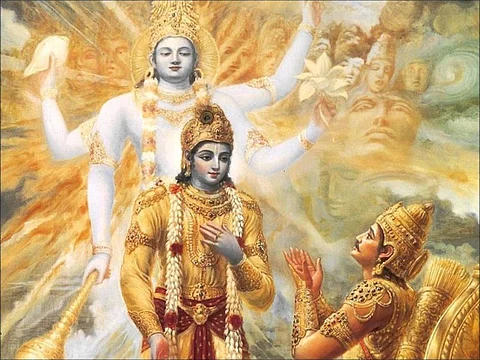
- Home
- NewsGram USA
- India
- न्यूजग्राम
- World
- Politics
- Opinion
- Entertainment
- On Ground
- Culture
- Lifestyle
- Economy
- Sports
- Sp. Coverage
- Misc.
- NewsGram Exclusive
- Jobs / Internships
- Interview

By Nithin Sridhar
The Bhagavad Gita is one of the most important spiritual and religious texts of Hinduism. Its significance lies in the fact that it contains the direct teachings of Lord Krishna, who is considered as the Poorna-Avatara (Complete Incarnation) of Brahman (God). From ancient Hindu masters like Adi Shankaracharya to modern Hindu mystics like Sri Aurobindo, all of them have written detailed commentaries on the Bhagavad Gita.
Hindus believe that it was on the Sukla Ekadashi (11th day in the bright fortnight) of Margashira month that Lord Krishna imparted the teachings about Dharma and Moksha to Arjuna on the battlefield of Kurukshetra and the day is celebrated as 'Gita Jayanti'. This year, 'Gita Jayanti' has fallen on December 21, i.e. today.
Here are the ten quotes from Bhagavad Gita on 'Dharma' (righteousness/duty) and human actions:
Treating happiness and sorrow, gain and loss, and victory and defeat with equanimity, engage in battle. Thus, you will not incur sin.
('Sin' here refers to the abandonment of duties as well as bondage to actions)
Here (in the path of Karma-Yoga i.e. Yoga of actions) there is no waste of an attempt; nor is there (any) harm. Even a little of this righteousness/duties saves (one) from great fear.
(One should strive to adhere to Dharma to the best of one's abilities, for even a little performance of Dharma gives great merits.)
Your entitlement is only towards the actions (you perform) and never towards the fruits (of those actions). Do not become an agent for the fruits of action (i.e. Do not perform actions with attachment to the fruits as it results in sorrow and bondage). May you not have any inclination towards inaction.
(One must neither perform actions with hankering for results, nor incline towards inaction because he has no entitlement towards the result. Instead, one should perform actions with a sense of duty and surrendering the fruits to the will of God)
One's own (material and spiritual) duty (as stipulated in the Hindu Scriptures according to one's temperament and station in life), though defectively performed is superior to the good performance of another person's duty. Death is better while engaged in one's own duty; another's duty is fraught with fear (because abandoning one's responsibilities due to the desire for another's privilege is Adharma).
O scion of the Bharata dynasty, whenever there is a decline of righteousness (Dharma) and an increase of vice (Adharma), then do I manifest Myself. For the protection of the pious, the destruction of the evildoers, and establishing Dharma, I manifest Myself in every age (i.e. Brahman itself will manifest in every age to uphold Dharma and destroy Adharma).
Even if a man of very bad conduct worships Me (i.e. Brahman/God) with one-pointed devotion, he is to be considered verily good; for he has resolved rightly. He soon becomes possessed of a virtuous mind; he attains everlasting peace. O Arjuna, proclaim thou for certain that My devotee never gets ruined.
(Even a great sinner or person of bad conduct can rectify his mistakes by practicing the devotion and righteous actions)
This door of hell, which is the destroyer of the soul, is of three kinds-passion/lust, anger, and greed. Therefore, one should forsake these three.
(Passion, anger, and greed delude people's mind and impel them to commit Adharmic/unrighteous actions that result in sorrow.)
Therefore, the (Hindu/Vedic) scripture is your authority as regards the determination of what is to be done and what is not to be done. After understanding (your) duty as presented by scriptural injunction, you ought to perform (your duty) here.
(One must determine one's personal duties/Svadharma by using the general principles of common and special duties prescribed in various Dharmic scriptures like Vedas, Dharmasutras, Smritis, etc.)
Fix your mind on Me (i.e. Brahman/God), practice Bhakti towards Me, be engaged in sacrifices (Yajnas) to Me and worship Me (Brahman/God) by salutations. (Thus) you will come to Me alone (i.e. you will attain Moksha/liberation). (This) truth do I promise to you. (For) You are dear to Me.
(One can attain Brahman by being completely devoted to Brahman)
Abandoning all forms of rites and duties, take refuge in Me (Brahman/God) alone. I shall free you from all sins. (Therefore) do not grieve.
(One should overcome all desires and renounce all worldly duties and dedicate themselves completely to Brahman, thus attaining oneness with Brahman and becoming free from sins.)
(With inputs from English Translation of Bhagavad Gita by Swami Gambirananda)
(Photo: iskcontoronto.blogspot.com)
